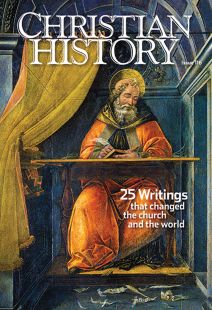2,000 years, 25 hymns
Order Christian History #116: Twenty-Five Writings that Changed the Church and the World in print.
Subscribe now to get future print issues in your mailbox (donation requested but not required).
FROM THE EARLIEST TIMES, Christians have associated “psalms, hymns, and spiritual songs” with teaching, personal disciplines (Col. 3:16), and confessing of God as Father, Son, and Holy Spirit (Eph. 5:18–21). Here are 25 of Christianity’s greatest hymn texts in chronological order.
1. Clement of Alexandria, “Shepherd of Eager Youth” (c. 200) Eastern church discipleship by the earliest post-NT composer we know by name
2. Ambrose of Milan, “O Splendor of God’s Glory Bright” (c. 390) The theology of ancient church councils expressed in song
3. Aurelius Prudentius, “Of the Father’s Love Begotten” (c. 410) Spanish-born poet-hymnist who influenced later Western breviaries and chants
4. Anonymous, “Be Thou My Vision” (before 600) Power amid spiritual warfare
5. Anonymous, “O Come, O Come Emmanuel” (700s) Invokes divine presence in oppressive times
6. Theodulf of Orleans, “All Glory Laud and Honor” (818) Classic processional in Holy Week
7. Francis of Assisi, “All Creatures of Our God and King” (1200s) Iconic Christian naturalist’s hymn to elicit praise from all creation
8. “O Sacred Head Now Wounded” (1200s) Christ as our atonement and our friend, famously set to music by Bach
9. Martin Luther, “A Mighty Fortress Is Our God” (1528) The “battle hymn” of Protestant reform that ignited Germany and the world
10. Thomas Ken, “Praise God from Whom All Blessings Flow” (1695) From a prayer written to engage his students
11. Isaac Watts, “Joy to the World, the Lord Is Come” (1719) Beloved worldwide as a Christmas carol
12. Charles Wesley, “O for a Thousand Tongues” (1739) Pietist-inspired Anglican who wrote 7,000+ hymns for missional devotion
13. Thomas Olivers, “The God of Abraham Praise” (1770) Messianic praise drawn from a Jewish hymn
14. John Newton, “Amazing Grace” (1779) God-ordained freedom from enslavement
15. Reginald Heber, “Holy, Holy, Holy” (1826) Worship of the Holy Trinity—reflecting Rev. 4:8 and the Nicene Creed
16. Folliott Pierpoint, “For the Beauty of the Earth” (1864) Written as the Industrial Revolution transformed cultures
17. Fanny Crosby, “To God Be the Glory” (1875) The favorite (out of 2,000+) by the blind poet that stirred many to new life and mission
18. Frank Bottome, “The Comforter Has Come” (1890) Written just before the Holiness tradition stirred revivals
19. Kate Wilkinson, “May the Mind of Christ My Savior” (1913) Aspiration to imitate Christ following Charles Sheldon’s book In His Steps (1896)
20. Daniel Iverson, “Spirit of the Living God” (1926) Among the earliest twentieth-century “praise choruses”
21. Thomas A. Dorsey, “Precious Lord, Take My Hand” (1932) A blend of blues and spirituals by the “Father of Gospel Music”
22. Stuart Hine, “How Great Thou Art” (1953) The Swedish “O Store Gud,” a Billy Graham favorite, along with “Just as I Am”
23. Peter Scholtes, “They’ll Know We Are Christians” (1968) By an American Catholic priest, especially beloved during the Jesus Movement
24. Bill and Gloria Gaither, “Because He Lives” (1971) Southern country-gospel-inspired hope
25. Stuart Townend and Keith Getty, “In Christ Alone” (2001) A new hymn embraced by many Christians worldwide CH
This article is from Christian History magazine #116 Twenty-Five Writings that Changed the Church and the World. Read it in context here!
By James D. Smith III
[Christian History originally published this article in Christian History Issue #116 in 2015]
James D. Smith III is professor of church history at Bethel Seminary and associate pastor of La Jolla (CA) Christian Fellowship. “I Have Decided to Follow Jesus” from Assam, India, is one of his personal favorites.Next articles
The dangers of compiling lists
Listing the best Christian books is not a new idea; maybe it's not even a good one
G. R. Evans25 writings: Recommended resources
We decided to recommend just one title for each featured author, although this meant ignoring many other excellent works; we urge you to examine past CH issues, our website, and other listed websites for more
the editorsEditor's note: Quakers
Jennifer Woodruff TaitSupport us
Christian History Institute (CHI) is a non-profit Pennsylvania corporation founded in 1982. Your donations support the continuation of this ministry
Donate




